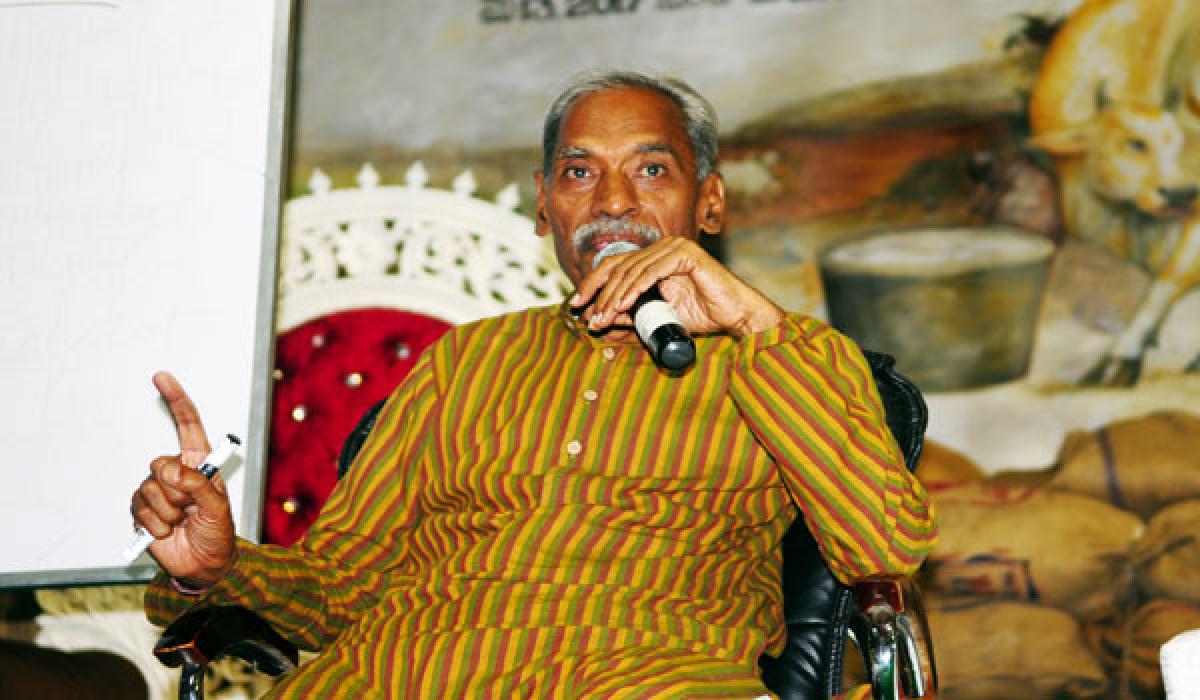Live
- Kothagudem: District to play key role in coal production
- Students can achieve greatness through education: Dattatreya
- District-Level Science Exhibition Concludes: 26 projects selected for State-level exhibition
- Atul suicide case: Wife absconds, cops arrest kin
- MP Raghuram demands high-level committee on Polavaram project
- Former KAS officer is successor to Vishva Vokkaliga Mahasamsthana Math
- Nagarkurnool: 3 staff members issued memos; investigation underway
- Govt medical college being constructed without supervision
- Shortcomings exposed at Gurukul hostels & govt schools
- ‘Art from Garbage’ exhibition showcases civic workers’ creativity
Just In

Subhash Palekar, a proponent of zero budget, natural farming (ZBNF), has accused the governments of encouraging farmers’ suicides by offering compensation after the debt-ridden farmers ending their lives, instead of bringing a change in agricultural policy to ensure a sustained agriculture.
Subhash Palekar, an advocate of zero budget and natural farming, is critical of governments doling out compensation to farmers who end their lives, instead of bringing about structural changes in agriculture sector
Hyderabad: Subhash Palekar, a proponent of zero budget, natural farming (ZBNF), has accused the governments of encouraging farmers’ suicides by offering compensation after the debt-ridden farmers ending their lives, instead of bringing a change in agricultural policy to ensure a sustained agriculture.
Popularly called as ‘Krishi ka Rishi’ by his followers, Palekar is critical of Indian agricultural scientists for causing “immense harm” to the farmers by way of giving advice to continue chemical and organic farming.In an exclusive interview with The Hans India, Palekar said ZBNF is a mass movement and it is not aimed against anyone.
“By 2050, world’s population is going to be 800 crore. There will be fall in cultivable land. Added to this, agriculture production is constantly on the downtrend due to chemical and organic farming and a serious food crisis is looming large on the world.
“The Punjab Agricultural University, which is the nodal agency in the country for the implementation of Green Revolution, has admitted that chemical farming has reached a saturation point and the yield of 61 quintals of paddy and 60 quintals of wheat per hectare cannot be increased by at any cost,” Palekar said.
He also said after the industrial sector, agriculture sector was responsible for global warming, which has turned out to be a major challenge. Due to chemical and organic farming, greenhouse gases, such as carbon dioxide, nitrous oxide, methane and chlorofluorocarbons (CFCs) are released into atmosphere leading to global warming.
India has agreed at the 15th session of the Conference of Parties (COP 15) to the United Nations Framework Convention on Climate Change at Copenhagen that it will reduce Greenhouse gases by 23 per cent. It will not be possible to stick to the commitment unless chemical and organic farming are banned in India, Palekar said.
Coming down heavily on the agriculture scientists and policymakers, he said those who devised policies in the name of offering solutions were ignorant of agriculture. Instead, policies such as compensation to the farmers after they commit suicide are in a way encouraging the debt-ridden farmers to take the extreme step.
These kind of wrong policies are encouraging suicides, he said. Chemical and organic farming is a pre-planned conspiracy to compel the farmers into purchasing chemical and organic fertilisers and pesticides. Crops produced using these fertilisers and pesticides contain residues of poisonous substances and harming the people.
Thus, both the crops and humans become weak, lose immunity and ultimately suffer from diseases forcing the farmers to buy more chemicals while humans are forced to buy allopathic medicines, he said. This way, a huge amount of money is reaching multi-national companies that manufacture and sell the chemicals and medicines. Indian currency is going out of the country and this is the great exploitation of Indian economy, Palekar said.
Chemicals and medicines are not the solution. The solution lies in improving the resistance power in the crops and humans. And this is possible only by adopting ZBNF.Asked whether some lobbies are behind the government policy in not promoting ZBNF, he said the answer for it should be given by the government.
By b g rajeswar

© 2024 Hyderabad Media House Limited/The Hans India. All rights reserved. Powered by hocalwire.com







